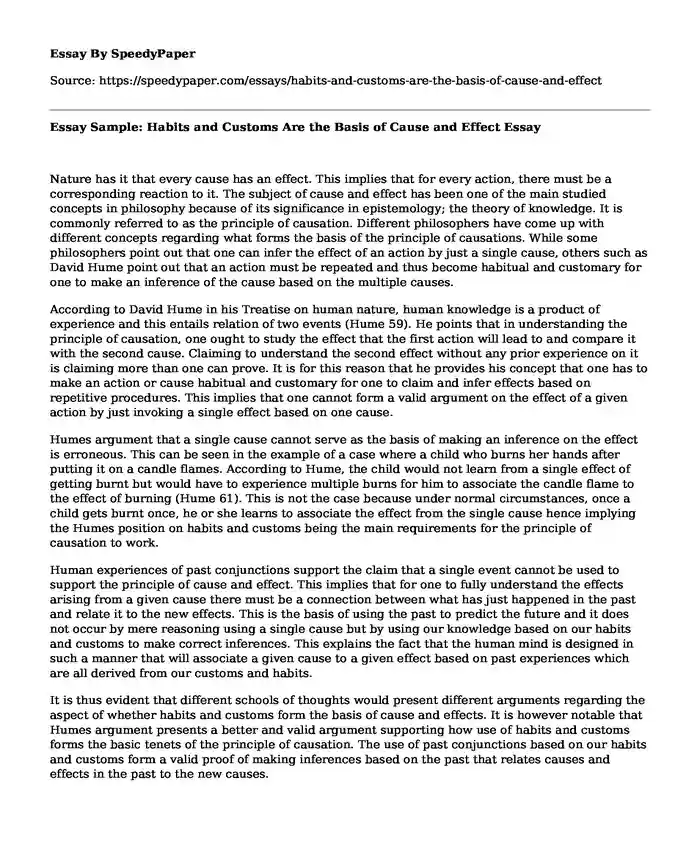
| Essay type: | Cause and effect essays |
| Categories: | Knowledge Philosophy Human |
| Pages: | 3 |
| Wordcount: | 624 words |
Nature has it that every cause has an effect. This implies that for every action, there must be a corresponding reaction to it. The subject of cause and effect has been one of the main studied concepts in philosophy because of its significance in epistemology; the theory of knowledge. It is commonly referred to as the principle of causation. Different philosophers have come up with different concepts regarding what forms the basis of the principle of causations. While some philosophers point out that one can infer the effect of an action by just a single cause, others such as David Hume point out that an action must be repeated and thus become habitual and customary for one to make an inference of the cause based on the multiple causes.
According to David Hume in his Treatise on human nature, human knowledge is a product of experience and this entails relation of two events (Hume 59). He points that in understanding the principle of causation, one ought to study the effect that the first action will lead to and compare it with the second cause. Claiming to understand the second effect without any prior experience on it is claiming more than one can prove. It is for this reason that he provides his concept that one has to make an action or cause habitual and customary for one to claim and infer effects based on repetitive procedures. This implies that one cannot form a valid argument on the effect of a given action by just invoking a single effect based on one cause.
Humes argument that a single cause cannot serve as the basis of making an inference on the effect is erroneous. This can be seen in the example of a case where a child who burns her hands after putting it on a candle flames. According to Hume, the child would not learn from a single effect of getting burnt but would have to experience multiple burns for him to associate the candle flame to the effect of burning (Hume 61). This is not the case because under normal circumstances, once a child gets burnt once, he or she learns to associate the effect from the single cause hence implying the Humes position on habits and customs being the main requirements for the principle of causation to work.
Human experiences of past conjunctions support the claim that a single event cannot be used to support the principle of cause and effect. This implies that for one to fully understand the effects arising from a given cause there must be a connection between what has just happened in the past and relate it to the new effects. This is the basis of using the past to predict the future and it does not occur by mere reasoning using a single cause but by using our knowledge based on our habits and customs to make correct inferences. This explains the fact that the human mind is designed in such a manner that will associate a given cause to a given effect based on past experiences which are all derived from our customs and habits.
It is thus evident that different schools of thoughts would present different arguments regarding the aspect of whether habits and customs form the basis of cause and effects. It is however notable that Humes argument presents a better and valid argument supporting how use of habits and customs forms the basic tenets of the principle of causation. The use of past conjunctions based on our habits and customs form a valid proof of making inferences based on the past that relates causes and effects in the past to the new causes.
References
Hume, David. A treatise of human nature. Courier Corporation, 2012.
Cite this page
Essay Sample: Habits and Customs Are the Basis of Cause and Effect. (2019, Sep 30). Retrieved from https://speedypaper.net/essays/habits-and-customs-are-the-basis-of-cause-and-effect
Request Removal
If you are the original author of this essay and no longer wish to have it published on the SpeedyPaper website, please click below to request its removal:
- Dissertation Abstract Example on Servant Leadership
- Case Study: HIPAA, CIA, and Safeguards, Free Essay for Everyone
- Free Essay: Plans for the Youths Ministry to Solve the Assimilation Problem
- Subject: Briefing Paper to the Minister on Tax and Pensions
- Essay Sample on "Citizen Kane" Analysis
- Free Essay Example. Poetry on Post-Modernism
- Paper Example: Characteristics of a Technical Document
Popular categories




